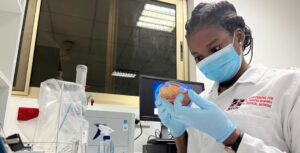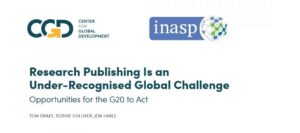Scientific publishing in Somalia: An interview with Dr. Jibril Handuleh
Dr. Jibril Handuleh is a psychiatry practitioner living and working in Somalia. He is an AuthorAID mentee as well. We got acquainted with each other recently after he saw my article on the AuthorAID pilot online course in the journal of the European Association of Science Editors.
Earlier this month, a short paper written by Dr. Handuleh was accepted for publication in The American Journal of Psychiatry, reputed to be the most widely read psychiatry journal in the world. I was delighted to hear of this success, and I thought his experience may be educational to researchers in developing countries who aspire to publish their work in leading journals.
Ravi: Thank you, Jibril, for agreeing to this interview. Could you please tell us a little bit about your work?
Jibril: You’re welcome. I work as a psychiatry practitioner and also in general medical practice at Amoud Teaching Hospital in Borama, Somaliland, a region in Northwestern Somalia. I am an assistant clinical lecturer in psychiatry, and I teach medical students, nurses, and other allied healthcare professionals at Amoud University School of Health Sciences. I established the mental health clinic and inpatient facility here after getting technical assistance from the King’s Centre for Global Health at King’s College London.
I have had a passion of medical writing and research since my medical school years when I used to read medical journals like JAMA and BMC. Last year, a group of Somali doctors began work on a new medical journal, the Somaliland Medical Association Journal, and I was invited to be an assistant editor. My editorial knowledge is in its infancy and fortunately a colleague of mine introduced me to the European Association of Science Editors (EASE). I became an EASE member 4 months ago. I have also applied for membership to the World Association of Medical Editors and the Eastern Mediterranean Medical Editors. I came to know about AuthorAID through EASE. I am desperate to learn because – as you may be aware – my country has been isolated from the rest of academic world due to the prolonged civil war.
Ravi: How did you get started as a researcher?
Jibril: I became involved with research and publishing after completing my internship and starting my teaching role in Amoud University in 2010. First, I was working with teaching faculty from King’s College London who were at my university the previous year to deliver clinical teaching. During this time, the team introduced clinical research skills, and I was supervised by a senior faculty member at King’s College London through a web portal named Medicine Africa, a web portal. I am the Somali coordinator of this link between Somalia and the King’s College London faculty members. The partnership includes research support for Somali doctors like me.
I have co-authored 2 articles with faculty members at King’s College London. One of these is a research article in JRSM Short Reports (July 2012), published by the Royal Society of Medicine, and the other is a commentary article in the Journal of Medicine, Conflict and Survival (January 2012), published by Taylor & Francis. Several of my papers are now under peer review at different journals.
Ravi: Do you face obstacles while writing or trying to publish? How do you overcome those?
Jibril: I face significant challenges in everything. I find it difficult to do literature review as most articles are not open access. There is no senior local supporter. No finance for research. Sometimes I spend my small salary on my papers, and I run into debt. I overcome these problems by using online academic tools as much as possible.
I recently began to publish commentaries, personal reflections, etc. as the lead author, such as this one in the journal Intervention. I believe that doing basic writing of this kind will guide me to the top.
Ravi: Please tell us about the research behind your most recent paper.
Jibril: The paper is about a community-oriented psychiatric inpatient unit in Borama, Somalia. I presented the case with both text and pictures. The research looks at community involvement in psychiatry, and the objective was to show how partnerships with clients and the general public affects service delivery and improvement. We collected data from a group of the community members and found that the community is eager to help if they have clinical leadership. The paper shows that clinical leadership and management is vital for psychiatric services.
This paper will appear as an “image” article in the psychiatry section of the American Journal of Psychiatry. Publishing in such a top journal is an honour. To prepare my paper, I read about the journal, its impact factor, whether it accepts articles from developing countries, instructions to authors, etc. I asked myself if the article was new and added something significant to psychiatry knowledge. Dealing with the reviewers’ comments was easy: I gave objective and precise answers.
Ravi: Do you have any advice on scientific publishing for researchers in developing countries?
Jibril: Read, write, talk to senior colleagues, and use great online resources like AuthorAID. I encourage everyone to try hard and be ethical. In the developing world, one has to be patient. If you have a target and you’re determined, you will win no matter how long it takes.




